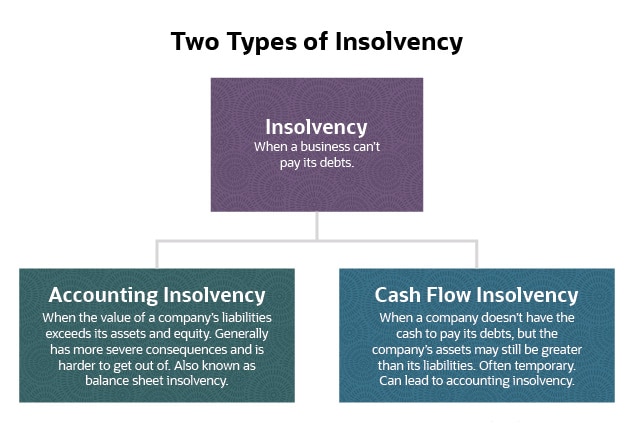Facts About Insolvency Practitioner Revealed
Facts About Insolvency Practitioner Revealed
Blog Article
Fascination About Insolvency Practitioner
Table of ContentsInsolvency Practitioner Fundamentals ExplainedThe Insolvency Practitioner DiariesRumored Buzz on Insolvency PractitionerInsolvency Practitioner Things To Know Before You BuyFacts About Insolvency Practitioner RevealedNot known Factual Statements About Insolvency Practitioner The Greatest Guide To Insolvency Practitioner
Insolvency is when liabilities are above the value of the company, or when a borrower can not pay the financial obligations they owe. A business can end up being financially troubled because of a variety of scenarios that cause inadequate cash money circulation. When confronted with insolvency, a business or individual can contact financial institutions straight and restructure financial obligations to pay them off.Bankruptcy can lead to bankruptcy process, in which lawsuit will certainly be taken against the financially troubled person or entity, and properties might be liquidated to pay off arrearages. Entrepreneur might get in touch with creditors straight and restructure debts right into even more manageable installations. Financial institutions are commonly amenable to this approach due to the fact that they intend to be settled and avoid losses, also if the settlement is on a postponed routine.
Unknown Facts About Insolvency Practitioner
The proprietor creates a proposal describing just how the debt might be reorganized using cost decreases or various other prepare for support. The proposal shows lenders how business may produce enough capital for successful operations while paying its financial debts. Commonly, a forgiven financial debt might be considered earnings by the Irs (INTERNAL REVENUE SERVICE).

Some Ideas on Insolvency Practitioner You Need To Know
When procedures cease, so does the business's income (Insolvency Practitioner). Some firms end up being insolvent due to the fact that their goods or solutions don't evolve to fit customers' changing demands.
Expenses surpass revenues and expenses continue to be unpaid. Cash-flow bankruptcy happens when a company has the assets to cover their debts yet they are in the wrong type, such as actual estate instead of fluid funds. Balance-sheet bankruptcy, on the other hand, suggests an absence of possessions in any type of kind to cover financial debts.
The IRS states that a person is bankrupt when the complete liabilities go beyond total assets. A insolvency, on the various other hand, is a real court order that depicts how a financially troubled individual or organization will pay off their lenders, or how they will offer their properties in order to website here make the payments.
Some Of Insolvency Practitioner

Recognizing the factors that can cause bankruptcy, such as overspending, can assist you stop bankruptcy and its consequences.
Insolvency Practitioner for Beginners
It is popular that supervisors and police officers of companies (and managers of restricted liability companies) owe fiduciary obligations to their organizations and their shareholders (or members). These fiduciary obligations are defined by state laws and, though there are variations from state to state, they generally include a task of commitment and a task of care.
The obligation of care calls for supervisors and police officers to exercise diligence, to make informed choices, and to act in good belief to ensure that their actions remain in the most effective passion of the get redirected here business. Though beyond the extent of this conversation, some states permit these tasks to be limited either by so noting in the business files or adhering to various other needs.
Everything about Insolvency Practitioner
Most states define bankruptcy in two ways( 1) when a business's liabilities end up being higher than the amount of its properties or (2) when the business comes to be unable to pay its financial obligations as they become dueand accept both interpretations (Insolvency Practitioner). The shift in tasks occurs due to the fact that when a firm is insolvent, there is no value in the business past that owed to the firm's creditors to ensure that the equity owners no much longer have an economic stake in the business
Take care regarding giving investors favoritism at the expense of creditors (e.g., accrediting and moneying a returns or a stock redemption). Beware about advantageous therapy in between classes of investors. Make practical initiatives to find out all the realities before taking a certain program of action; directors should genuinely believe that any kind of decisions made remain in the most effective passions of the firm in its whole (i.e., choices will be assessed in hindsight because of the result of such activities on the corporation).
In any kind of insolvency or insolvency case, settlements made to specific creditors at the cost of various other creditors can be clawed back, specifically if there is some connection between the firm and the lender. Consider recommending at a yearly investor meeting (or any other meeting of investors) a resolution affirming that all previous company decisions and activities taken by the directors and policemans of the firm were taken in excellent belief after a workout of affordable care.
4 Simple Techniques For Insolvency Practitioner
Fully reveal any kind of individual or description business relationships with parties on the other side of deals including the company to avoid the appearance of a conflict of interest. In assessing prospective fund elevating purchases or a sale of properties of the struggling corporation, understand that these transactions might be looked at later because of any succeeding growth of directors' fiduciary responsibilities to consist of financial institutions.
Report this page